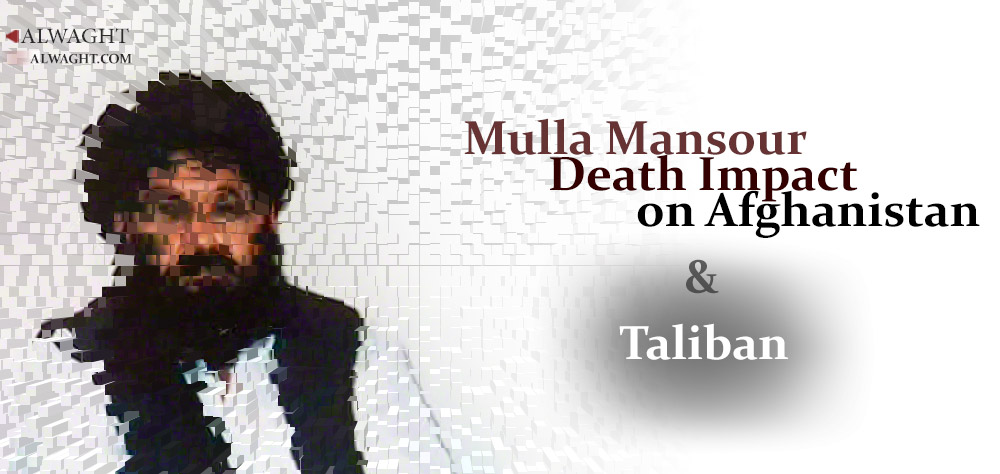Alwaght- The US and Afghanistan officials' claims of death of the leader of Taliban Mullah Akhtar Mansour have been confirmed by a top commander in the militant group after Pakistan, and Taliban itself, denied the incident.
Taliban has so far failed to react, even now that the killing of its leader is confirmed.
The social media circulated on Sunday an image claimed to be showing the body of Akhtar Mansour.
The Pentagon has issued a statement, asserting that Taliban leader was killed in a US drone strike on late Friday night in a remote area in Pakistan-Afghanistan border.
The Chief Executive of Afghanistan Abdullah Abdullah has claimed that Mansour came under a strike inside Pakistan’s territory.
The death of Taliban leader brings forth consequences for the militant group and Afghanistan. Odds are that following death of Mansour, Taliban suffers impairment and split, and would give place to the terrorist organization ISIS, which is active now majorly in Syria, Iraq and Libya.
What are the consequences of Mansour’s death?
- Dispute over leadership of Taliban. The divides and internecine conflict would hit a climax again inside Taliban about the replacement of leadership of the militant group after official announcement of Mansour’s death. After confirmation of death, the claims for leadership would be raised by, on the one hand, Mullah Rasul, Mullah Yaqub and Mullah Abdul Manan Nizai and the insurgent group Haqqani Network on the other hand. Mullah Hebatullah Akhondzadeh as well as Sirajuddin Haqqani- both deputies to Mullah Mansour who took the posts after death of former Taliban leader Mullah Omar- would be claimers of succession of Mullah Mansour.
Mullah Muhammad Yaqub is the older son of Mullah Omar. Yaqub was named as possible successor to his father. In such conditions, Yaqub would also seek leadership of Taliban. Furthermore, Mullah Mohammad Rasul, the leader of a Taliban split group, is another figure who would seek succession, though the Afghan sources claim he was abducted a couple of months ago when he was on his way to Pakistan’s Quetta, and his fate remains uncertain yet.
- Widened division of Taliban. Now that Mullah Mansour is killed, it is expected that rifts inside the body of Taliban resurface again, especially that Mullah Rasul's loyalists saw Mullah Akhtar as an agent of Pakistan’s Inter-Services Intelligence (ISI) and so refused to accept him as leader of the militant group. With Taliban deeply divided, the rival groups like ISIS, which is new to Afghanistan, find the ground prepared for their activity.
- Suspension of peace talks with Taliban and ongoing insecurity in Afghanistan. Now that the peace accord between the Afghan government and the insurgent group Hizb-e Islami, led by Gulbuddin Hekmatyar, is in its way to finalization, killing of Mullah Mansour would again send the already-troubled peace negotiations with Taliban more difficult and complicated.
- Strong rise of ISIS in Afghanistan. Taliban-ISIS as well as intra-Taliban clashes in recent months have weakened Taliban. Confirmation of death of Mullah Mansour would pave the way for ISIS to boost power and presence in Afghanistan. It is very likely that ISIS gets members from the body of Mullah Akhtar Mansour’s split group, especially now that divides are widening inside Taliban.
- Kabul-Islamabad tension escalation. The Afghan leaders have always accused Pakistan of cooperation with terrorist groups. They argue that Islamabad stands behind all of suicide attacks and blasts carried out by Taliban group. These accusations fanned tensions between Kabul and Islamabad. Afghanistan's deputy minister of defense believes that from now on heightened tensions would be observed in the two neighbors' relations.
In addition to these consequences, there must also be a focus on the repercussions of Taliban impairment:
- ISIS could expand to Iran’s eastern borders which are shared with Afghanistan. Following Iran’s nuclear deal with the 5+1 and lifting the Western sanctions, Saudi Arabia, a major regional supporter of the extremist groups, and the West have set up plans to damage Iran.
- The takfiri terrorists in West Asia would get renewed manpower.
- Deterioration of security crisis in Yemen, Syria, Iraq, and then Iran.
- Developing new balance of power through transfer of crisis to Russia’s area of security and Central Asia.
Finally, it appears that killing of Mullah Mansour is part of a scenario to recruit members of Taliban to inflame the ISIS-led proxy war in the region, as the US needs existence of terrorist groups like ISIS in Afghanistan to justify its presence in the war-torn country.
Likely, Washington would claim that killing of Taliban leader would result in disappearance of the militant group- the same job it did after it killed Al-Qaeda leader Osama bin Laden in Pakistan’s Abbottabad.
What is obvious is that the Washington-Kabul security pact not only has not done much to help improve security and stability in Afghanistan but also it saw continuation of the West's ambiguous and multifaceted policies.
It appears that the West and some of regional countries are eyeing strengthening of the takfiri extremists, and they set to back the terrorist groups more than ever, all to use them for their own goals.



























